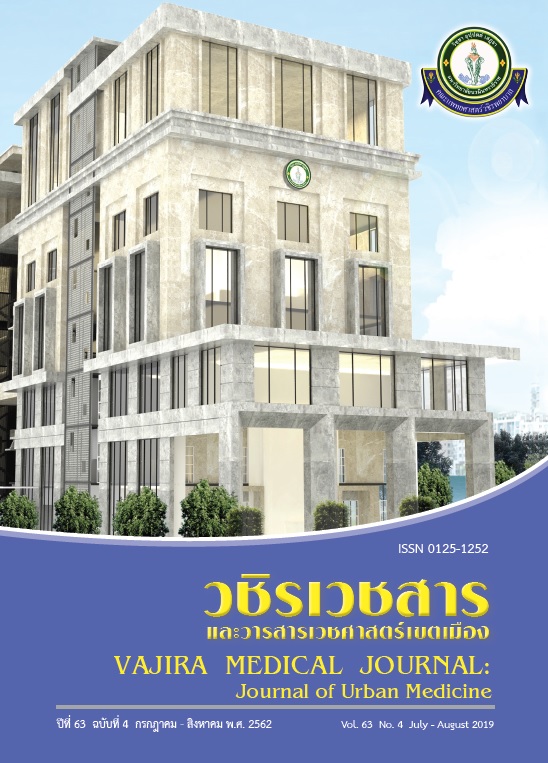The Effectiveness of a Health Education Program Applying Pender’s Health Promotion Model on Self Health-Care Behavioral Modification of Patients with Type 2 Diabetes Mellitus in Sub-District Health Promoting Hospital, Bankha District, Ratchaburi Province
Main Article Content
Abstract
Objective: To study the effectiveness of a health education program applying Pender’s health promotion model on self health-care behavioral modification of patients with type 2 diabetes mellitus in Sub-District Health Promoting Hospital, Bankha District, Ratchaburi Province.
Methods: This study was an experimental design. The sample used in this research was 64 type 2 diabetes patients. They were selected according to the inclusion criteria and were randomly divided into experimental and control groups. Each group consisted of 32 patients. The trial period was 12 weeks. The experimental group received a health education program applying Pender’s health promotion model on self-health care behavioral modification while the control group received the usual health care knowledge from the sub-district health promoting hospital. The questionnaires were used as the instrument in this research to collect the diabetes patient data in 4 times, before, after, and two following trials. The data were analyzed by frequency percentage, mean, standard deviation and repeated measure analysis of variance.
Results: The findings showed that 1). The experimental group, after-trial period, obtained higher mean scores in terms of diabetes knowledge, perceived benefits, self-efficacy, activity-related affect, interpersonal and situational influences, commitment to plan of action, and health promotion behaviors higher than those in before-trial period and also higher than the control group with the statistical significant level of p 0.05. 2). The mean scores of perceived barriers between the experimental and control groups were not significantly different (p
0.05). 3). The mean change in the levels of fasting blood sugar in the experimental group in after-trial period was significantly lower than that in before-trial. 4). The average level of fasting blood sugar during 4 periods of trials between the experimental and control groups was not statistically different (p
0.05), but interaction effect (number of times of treatment X groups) was statistical significance (p = 0.03).
Conclusion: These findings can be used as a guide in planning health-promoting behavior change for the health care of patients with diabetes and other patients with non-communicable chronic diseases.
Downloads
Article Details
References
2. Thailand Blueprint for Change 2017. [Cited 2018 September 15]. Available from: https://www.novonordisk.com/content/dam/Denmark/HQ/sustainablebusiness/performance-on-tbl/more-about-how-we-work/Creating%20shared%20value/PDF/Thailand%20Blueprint%20for%20Change_2017_TH.pdf.
3. Diabetes Association of Thailand under The Patronage of Her Royal Highness Maha Chakri Sirindhorn, Endocrinology Association of Thailand, Department of Medical Services, Ministry of Health, and National Health Assurance Bureau. Clinical practice guideline for diabetes 2014. Bangkok: Arun Printing; 2014.
4. Rungsin R, Tasnawiwat P. An assessment on quality of health care of type 2 diabetes and hypertension patients in hospitals under Ministry of Health and Bangkok metropolis in 2012. Bangkok: National Health Assurance Bureau; 2012.
5. Sub-District Health Promoting Hospital Nongpanjan. Statistical data of type 2 diabetes mellitus patients in Sub-District Health Promoting Hospital Nongpanjan, Bankha District, Ratchaburi Province; 2017.
6. Loykaew, K. Health problems of type 2 diabetes mellitus patients in Sub-District Health Promoting Hospital Nongpanjan, Bankha District, Ratchaburi Province; 2017.
7. Pender NJ, Murdaugh CL, Pearson MA. Health promotion in nursing practice. 6th ed. Boston, MA: Pearson/Prentice Hall; 2011.
8. Vorapongsathorn S. Research in health education. Bangkok: Witoon Karnpog Printing; 2014.
9. Nopsopon S. Effects of the health promotion program on health promoting behavior among patients with type 2 diabetes mellitus in Bangtoey Sub-District Mueang District, Chachoengsao Province [Thesis]. Chachoengsao: Rajabhat Rachanakarintra University; 2016.
10. Khamkeo K. Effects of health promotion program on health promotion behaviors among type 2 diabetes patients in Sethathirath hotspital Vientiane capital [Thesis]. Pitsanulok: Narasuan University; 2014.
11. Tawatwattananan A. The outcomes of health promotion program for diabetic retinopathy patients [Thesis]. Bangkok: Christian University; 2014.
12. Sanyanuban N. Effectiveness of health promotion program towards self-care behaviors of the diabetes mellitus patients [Thesis]. Nakhon Sawan: Rajabhat Nakhon Sawan University; 2010.
13. Intara-asa A. Effects of health promotion program on non-insulin dependent diabetes mellitus patients of Ban-Sabua health center, Phayuha Khiri district, Nakhon Sawan Province [Thesis]. Nakhon Sawan: Rajabhat Nakhon Sawan University; 2009.
14. Faul F, Erdfeldes E, Lang AG, Buchner A. G* Power 3.1.9.2 : A flexible statistical power analysis program for the social, behavioral, and biomedical sciences. Behav Res Meth, 2014; 39(2): 175-91.
15. Bloom BS, Hasting T, Madaus G. Handbook of formative and summative evaluation of student learning. New York, USA: McGraw-Hill; 1971.
16. Angchoun A. The effect of health promoting program on HbA1c of type 2 diabetes mellitus patients [Thesis]. Bangkok: Chulalongkhorn University; 2006.
17. Somkamsri N, Kulnapadol P, Chaiwimol R.
The effects of rational emotive behavior group counseling on self-system of diabetes mellitus patients. J. of Education. Burapha University. 2013; 24: 116-28.
18. Dhabdhimsri L. Effects of information and emotional support on foot care behavior of non-insulin dependent diabetic patients [Thesis]. Chiang Mai: Chiang Mai University; 1998.
19. Chobngam S. Rational emotive group therapy on anxiety of diabetic mellitus patients [Thesis]. Khon Kaen: Khon Kaen University; 2005.
20. Praingam S. The effects of group process together with social support on self-care knowledge and behavior in non-insulin dependent diabetes mellitus patients in Bothong District Chonburi [Thesis]. Chonburi: Burapha University; 2003.
21. Puangkwun S. The effects of supportive-participative education on diabetic knowledge, diabetic control behaviors, fasting blood sugar, and HbA1c in diabetic patients [Thesis]. Bangkok: Mahidol University; 2002.
22. Totermsuck V. The study of perceived benefits and situational influences to exercise behavior in the elderly with diabetes mellitus. J. of Baromrajchoni Nursing College Ratchaburi. 2000; 12: 1-5.
23. Tajarernwiriyakul A, Suwannakud KS. Health perceives and self-care behaviors of people with diabetes mellitus in Tungmon Sub-District, Prasat District, Surin Province. J. of Res and Health Development. 2016; 9: 331-8.
24. Wungrath J , Saengyo S, Ummee K. Barriers to health care practice that impact to glycemic control among elderly with diabetes mellitus. J. of Com. Develop. and Quality of Life. 2018; 6: 351-61
25. Institute of Teaching Promotion in Sciences and Technology. Seeking, development and intelligence supporting in sciences. Bangkok: n.p.; 2003.


